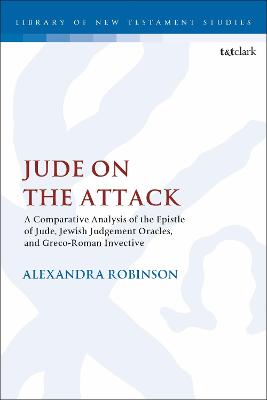The Library of New Testament Studies
1 total work
Alexandra Robinson examines the letter of Jude in the light of repeated scholarly references to this source as an invective, a polemic, and an attack speech, with a dependence on both Jewish and Greco-Roman sources. Moving beyond the ‘Hellenism/Judaism divide’, Robinson specifies what these elements are, and how they relate to the harsh nature of the discourse.
This study shows how, where, and why Jude borrows from these contemporary genres, with a detailed survey of Greco-Roman invectives and Jewish judgement oracles; comparing and contrasting them to the epistle of Jude with consideration of structure, aims, themes, and style. Robinson argues that Jude has constructed a ‘Jewish invective,’ and that his epistle is a polemical text which takes the form (structure, aims, and style) of a typical Greco-Roman invective but is filled with Jewish content (themes and allusions), drawing on Israel’s heritage for the benefit of his primarily Jewish– Christian audience.
This study shows how, where, and why Jude borrows from these contemporary genres, with a detailed survey of Greco-Roman invectives and Jewish judgement oracles; comparing and contrasting them to the epistle of Jude with consideration of structure, aims, themes, and style. Robinson argues that Jude has constructed a ‘Jewish invective,’ and that his epistle is a polemical text which takes the form (structure, aims, and style) of a typical Greco-Roman invective but is filled with Jewish content (themes and allusions), drawing on Israel’s heritage for the benefit of his primarily Jewish– Christian audience.
